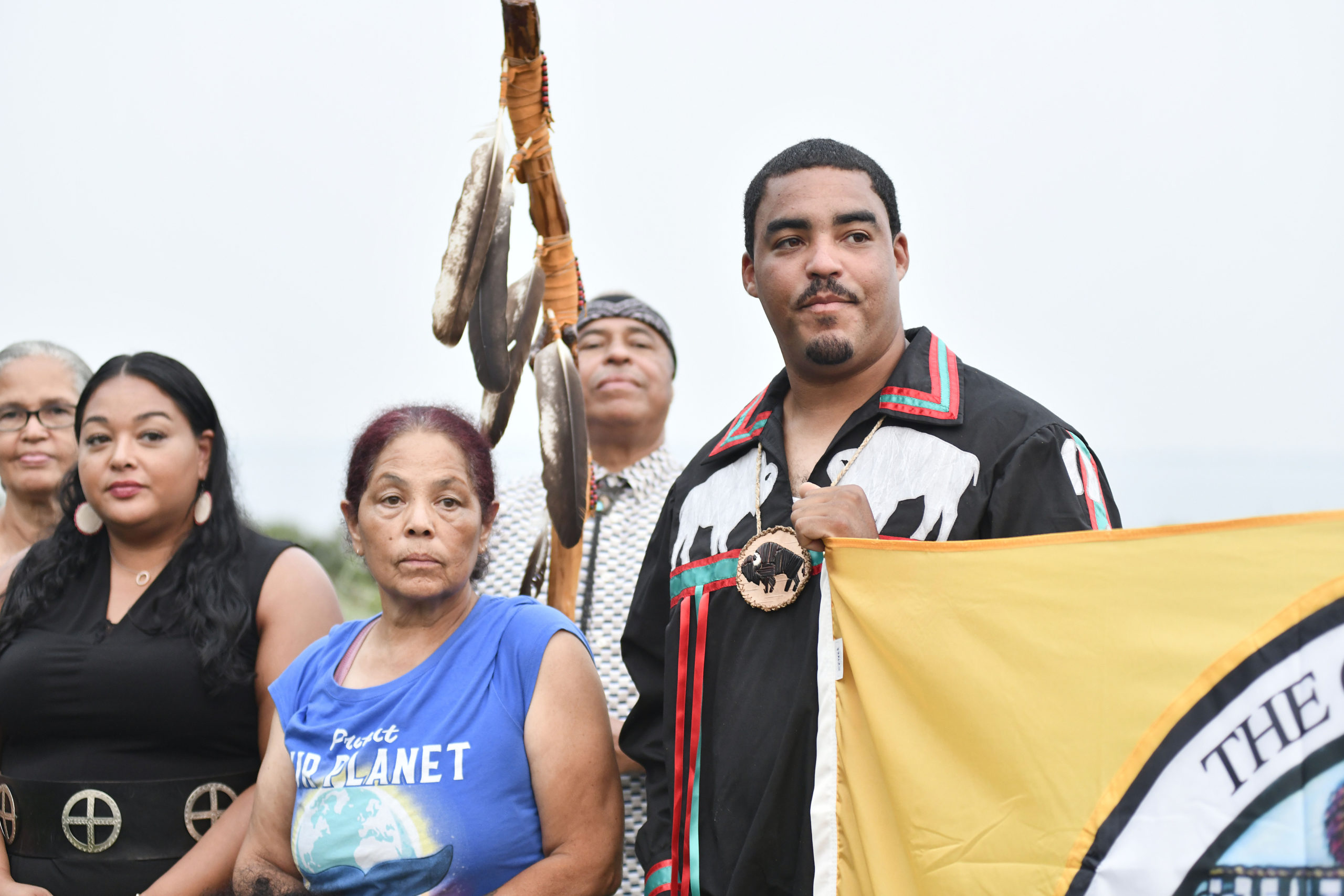
Tuesday, July 20, was a day of celebration for members of the Shinnecock Nation, some of whom gathered at the summit of Sugar Loaf Hill, the tribe’s most sacred burial ground, to mark its return.
The Shinnecock Nation Graves Protection Warrior Society had announced earlier in the day that the Peconic Land Trust had closed on the $5.6 million purchase of the 4.5-acre parcel in Shinnecock Hills from the Nappa family. Southampton Town will spend $5.3 million from the Community Preservation Fund to purchase the development rights to the site with the rock star Roger Waters contributing $300,000 to cover the difference. The trust plans to transfer title to the property to the Shinnecock after a 7,000-square-foot house on the property is demolished and the property returned to its natural state, but the mechanism for that transfer has yet to be worked out.
“This is probably one of the best feelings you can hold dear to your heart,” said Rebecca Genia, co-chair of the graves protection society and a long-time advocate for the protection of tribal graves. She added that ever since the tribe had been relocated to Shinnecock Neck in 1859, it had wanted to return to the site. “We’re here and we are going to restore our beautiful Sugar Loaf Hill to its beautiful natural state,” she said.
“It’s been a long time coming,” said co-chair Shane Weeks, as about 20 tribe members gathered behind a Shinnecock flag with an expansive view of Shinnecock Bay behind them. “For us to be able to get as far as we are here today in our ancient burial ground is a huge accomplishment, and I think it honors our past ancestors as well as those future generations that will come after us.”
After a brief press conference, members of the tribe gathered for a prayer service as the moon rose over the bay.
The newly protected parcel is on the south side of Montauk Highway, its crest reached by a winding driveway. Although it is part of the Sugar Loaf Hill Critical Environmental Area and has been recognized as the most important Native American burial ground in New York State, years ago, Southampton Town allowed it to be developed. The property is now dominated with a sprawling shingle-style house. It would seem likely that graves were disturbed during its construction.
Both Mr. Weeks and Tribal Chairman Bryan Polite said it was possible the property may be used as a place to rebury the remains of Shinnecock that have been placed in other cemeteries or held in private collections and that the tribe is working to repatriate.
Mr. Polite, in an interview Tuesday afternoon, said the return of the Sugar Loaf Hill property was important for two reasons. “First, our ancestors will get to rest in peace,” he said. “The second is cultural pride. The Town Board has recognized what it so often ignored in the past.”
Both men praised the Town Board, as well as the Peconic Land Trust, for working with the tribe to secure the complex deal to protect the land.
Supervisor Jay Schneiderman said the protection of the land was an important step for both the town and the tribe.
“I think it will go a long way toward repairing the relationship between the town and the Shinnecock,” he said. “It doesn’t undo the hurt, but it does help cleanse the wound.”
He said there remained some legal issues before the land can be returned to the tribe, noting that the town would require “a waiver of sovereign immunity” from the tribe, so town law could be enforced on the land, but he expressed confidence that the details could be worked out.
John v.H. Halsey, the president of the Peconic Land Trust, said he was pleased his organization was able to serve as a bridge between the town and the tribe. “This is a long time coming, and a promise for a new beginning in the relationship between the town and the Shinnecock people,” he said.
“I’m not happy. I’m grateful,” said Jennifer Cuffee-Wilson, a member of the tribe, who said she was pained that it had taken so long for the land to be returned. “I’m grateful that our ancestors can rest. It’s the start of a healing.”